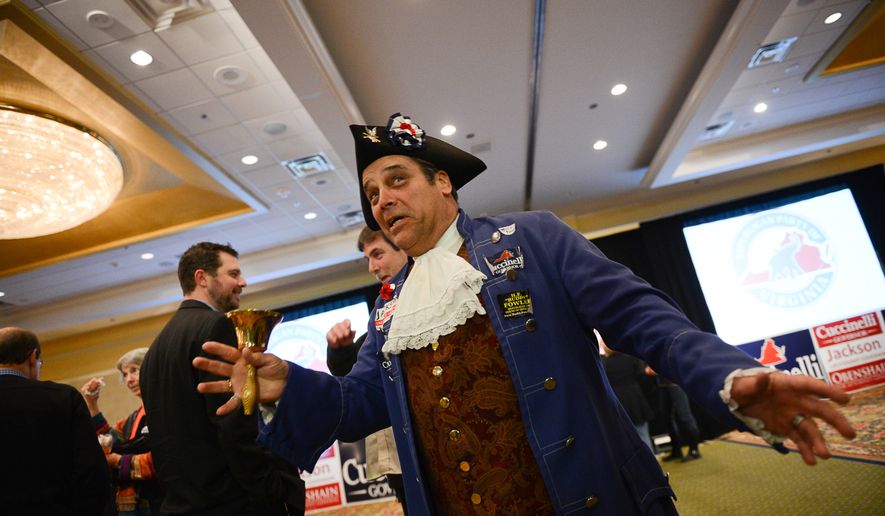OPINION:
Want to know everything you need to know about why America’s great, in the span of a few short paragraphs?
Read Patrick Henry’s “Give Me Liberty or Give Me Death” speech. It’s America, personified; it’s Americans, at their best.
The background is this: Henry, then-delegate to the Second Virginia Convention, was trying to convince his colleagues in Richmond that their peace-at-any-and-all-costs pressings to keep the British crown at bay was fruitless and folly.
The hand-wringers of the bunch couldn’t get it through their heads that death and war were imminent, no matter how hard they tried, at that point, to soothe King George III.
“Mr. President,” Henry said, at the St. John’s Church in March of 1775, “it is natural to man to indulge in the illusions of hope. We are apt to shut our eyes against a painful truth, and listen to the song of that siren till she transforms us into beasts. Is this the part of wise men, engaged in a great and arduous struggle for liberty? Are we disposed to be of the number of those who, having eyes, see not, and, having ears, hear not, the things which so nearly concern their temporal salvation? For my part, whatever anguish of spirit it may cost, I am willing to know the whole truth; to know the worst, and to provide for it.”
Translation: The truth shall set you free — and that means free to see the path of action that must be pursued.
“I have but one lamp by which my feet are guided; and that is the lamp of experience,” he went on. “I know of no way of judging of the future but by the past. And judging by the past, I wish to know what there has been in the conduct of the British ministry for the last ten years, to justify those hopes with which gentlemen have been pleased to solace themselves, and the House? Is it that insidious smile with which our petition has been lately received? Trust it not, sir; it will prove a snare to your feet.”
Translation: Just what has the crown of Britain done in the past 10 years to justify any type of hope that war can be avoided? The king’s run roughshod over the colonists’ rights; no sense in sugar-coating the truth to hide and pretend friendly relations. He then continued by pointing to the ships of Britain that were speeding toward America’s shores and asked, “Are fleets and armies necessary to a work of love and reconciliation?”
Good question. And it’s one he answered a few seconds later.
“They are meant for us,” he said. “They are sent over to bind and rivet upon us those chains which the British ministry have been so long forging. And what have we to oppose to them? Shall we try argument?”
If Barack Obama suddenly popped in your mind — you’re not alone.
And here’s the part of Henry’s speech that drives to the core of Americanism: “They tell us, sir, that we are weak; unable to cope with so formidable an adversary … [But] we shall not fight our battles alone. There is a just God who presides over the destinies of nations; and who will raise up friends to fight our battles for us. The battle, sir, is not to the strong alone; it is to the vigilant, the active, the brave. … The war is inevitable and let it come! I repeat it, sir, let it come.”
Let it come. A phrase bested only perhaps by Gen. George Patton’s June 1944 speech to the Third Army in England: “Why, by God, I actually pity those poor sons-of-b—s we’re going up against.”
This is the America we celebrate on the Fourth of July.
This is the America that was fought and forged by packs of patriots who railed against all-things-bondage to bring us to a time of freedom for all — to a modern-day nation where men and women, whites and blacks, young and old, poor and wealthy, can all share in and cherish the same set of God-given liberties.
“Is life so dear, or peace so sweet, as to be purchased at the price of chains and slavery? Forbid it, Almighty God! I know not what course others may take,’ Henry finished, “but as for me, give me liberty or give me death!”
It’s good to remember the rocks upon which our nation was founded — the sacrifices that were made, the personal losses that were suffered, the fiery calls to arms that, if uttered today, would leave the liberals gasping in shock and horror.
It’s good to remember that in all this anti-President Donald Trumpism floating about, all this rising socialist-minded Democrats taking front and center, all this frightened politically correct politicking that passes as proper governing nowadays — the country wasn’t always this way.
Once upon a time, strength and courage and bold leadership with firm reliance on God was the country’s path and pursuit.
And what’s optimistic is this: That spirit is still alive in modern-day America. It may have fogged a bit here, clouded a bit there. But it’s still alive and kicking and rocking all that’s still great about the country.
• Cheryl Chumley can be reached at cchumley@washingtontimes.com or on Twitter, @ckchumley.




Please read our comment policy before commenting.